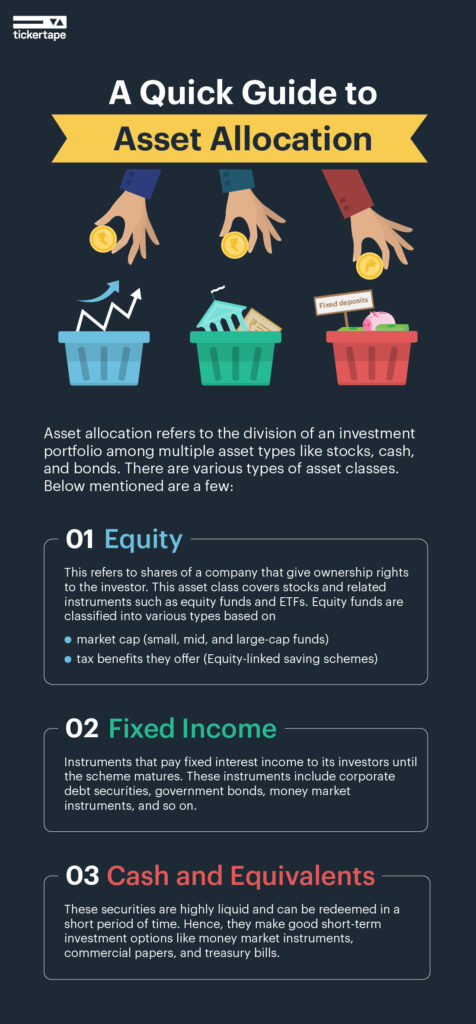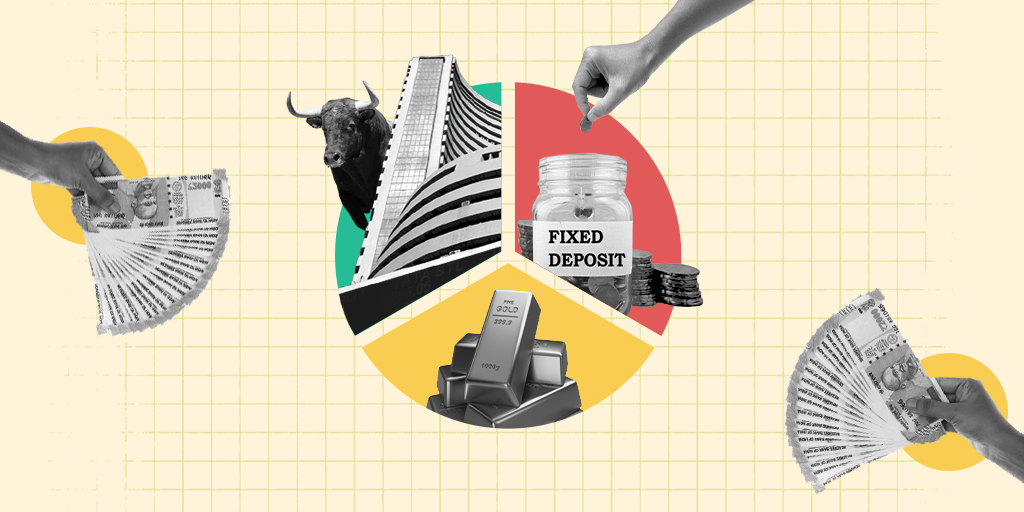Last Updated on May 24, 2022 by Aradhana Gotur
If you have ever cooked a meal, you will know that the ingredients you choose to put into a dish are as essential as the recipe—how much or how little of an ingredient you add can make or break the item you are preparing. Your investment portfolio is no different. However, what asset class (equity, debt, cash or gold) you choose to add to your portfolio and in what proportion, also referred to as asset allocation, can make or break your portfolio. Read on to find out why.
Table of Contents
What is asset allocation?
Saving and investing are two different things. Merely saving money does not amount to much since factors like inflation negatively impact the value of your cash in hand over time.
Meanwhile, as an investor, you consciously invest your savings, despite risks, to create wealth, which is your reward. You also look to protect this wealth from factors like taxation and inflation.
So, what is asset allocation? And what does it have to do with your investment portfolio?
As part of your investment strategy, you use your savings to buy assets from financial markets, which could be either company stocks or government bonds, or even gold. Each asset class reacts differently under various market conditions and to real-world events. For example, in a time of war-like conditions, stock and debt markets may plummet while gold prices appreciate. So, the idea of a well-balanced portfolio means your asset allocation earns you an average steady return on investment.
A poorly designed portfolio could mean that you may not be successful in achieving your financial goals, which could either be your child’s education or buying a new car or a house, or even your retirement corpus.
Since you make investment decisions with an eye on your future, guided by your aspirations and anticipated requirements, your short- to long-term goals and your risk appetite determine how your portfolio shapes up as well.

What are the various types of asset classes?
Equities: These are some of the most popular asset classes that can be part of your portfolio. Equities are the key to the generation of returns and capital appreciation. It is known to every investor that investing is an art. Paint a picture of what your needs are and how much is your risk appetite. Staying realistic is the best way, know that not every day is sunshine, if you are going in it for the long term, patience is necessary despite the rise or fall of the market.
Debt: This is essentially the market for fixed income securities issued by either the central or state governments or public or private companies looking to finance their projects. Debt market instruments could range from a couple of days to a few years. The market is considered less volatile than equities.
Other asset classes include cash, real estate, gold, commodities, derivatives, and mutual funds.
How is asset allocation different from diversification?
Asset allocation is the proportion of various asset classes that make up your investment portfolio. Diversification could either be between asset classes or between assets within a particular asset class.
Suppose you are in the process of building your investment portfolio and decide to invest 60% in equities, 30% in debt and 10% in gold. That is a breakdown of your asset allocation. What makes up the 60% in equities will determine whether your portfolio is well diversified. If the equities section of your portfolio only contains blue-chip stocks (large companies), then it is safe to say your portfolio is not well diversified.
Diversification could also refer to diversification across investment styles and whether you have diversified globally so that the impact of a local market crash does not impact your entire portfolio.
Conclusion
Proper asset allocation and diversification are both essential to ensure that a single significant economic event or policy change does not render your entire portfolio in the negative.
How you design your portfolio is subject to the stage of your life at present and the future you foresee for yourself and your family. But more importantly, how to maintain your wealth is as important as how you create it. That is, your investment portfolio is not a one-time matter to be handled and then forgotten. Instead, just like you would care for a plant, it needs constant attention.
- Best Performing Index Funds in India (2025) - Jun 5, 2025
- Issue of Shares – Meaning, Types, Examples and Steps - Jun 4, 2025
- Banking Mergers in India – List of Merged PSU Banks, Advantages, and Challenges - Jun 3, 2025





